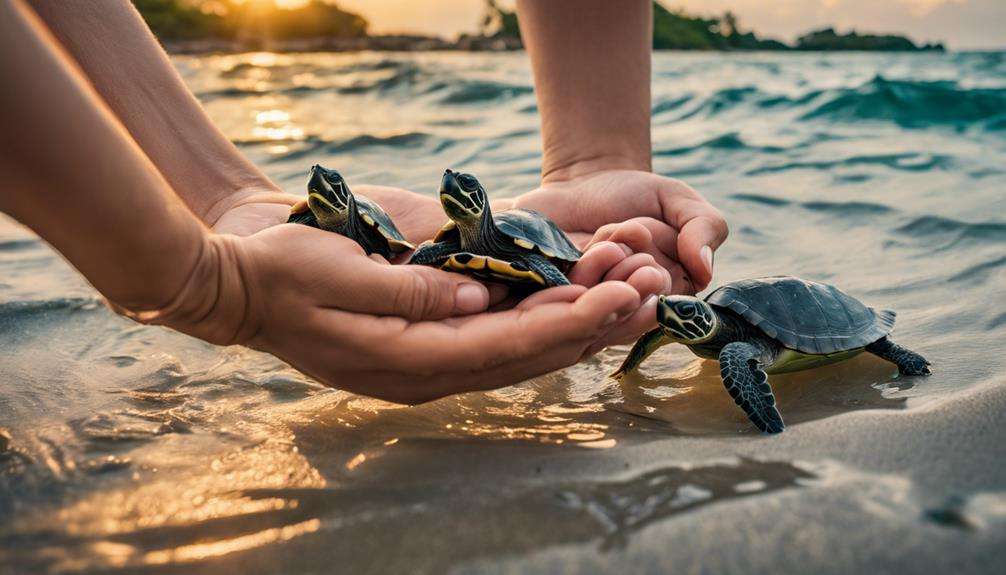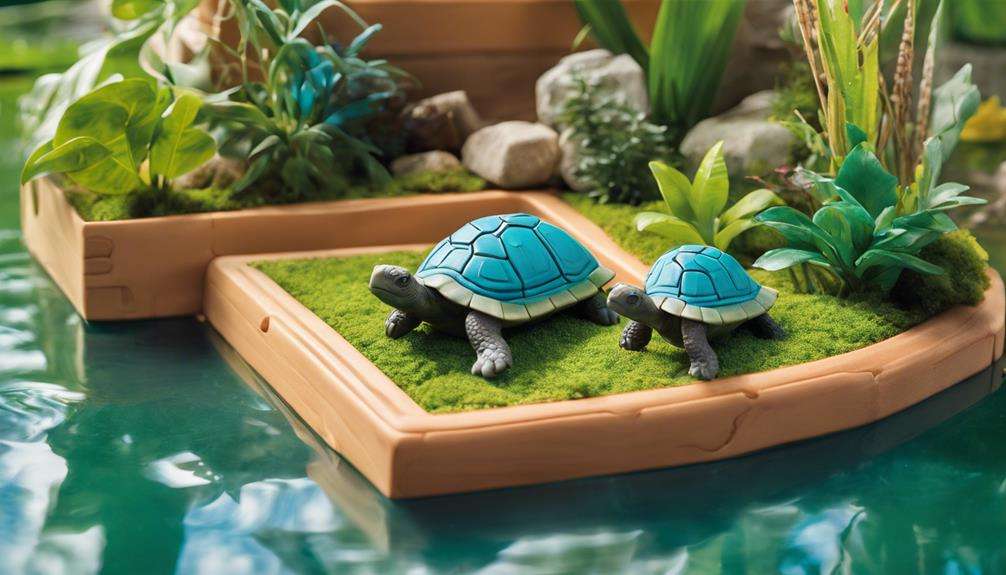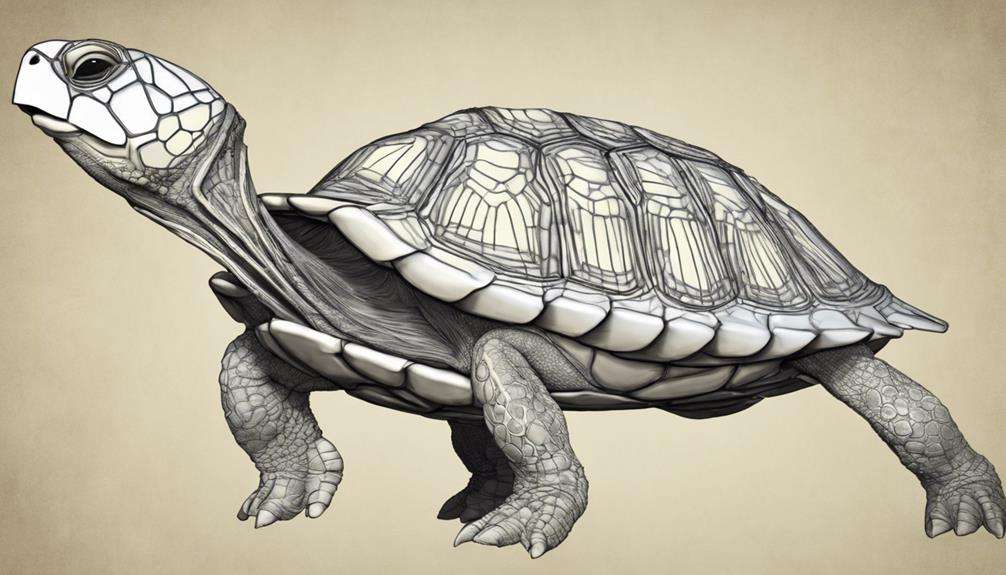So, you've decided to venture into the world of exotic turtle ownership, huh?
Well, before you jump straight into the deep end, let's talk about some top tips for caring for these unique pets.
From creating the ideal habitat to understanding their dietary needs, there are important aspects that you need when taking on the responsibility of caring for exotic turtles.
Stay tuned to discover the essential guidelines that will help you provide the best possible care for your exotic turtle companion.
Key Takeaways
- Regular veterinary check-ups are vital for exotic turtles' health and unique needs.
- Offer a balanced diet with protein, plant matter, and calcium supplements.
- Provide a habitat with proper water-to-land ratio, temperature, and humidity levels.
- Recognize and address behavioral signs, shell abnormalities, and respiratory issues promptly.
Exotic Turtle Veterinary Care Essentials
When caring for exotic turtle pets, ensuring regular veterinary check-ups by an exotic animal specialist is essential for maintaining their health and well-being. Exotic turtles have unique biology that may require specialized medical care. It's important to consult a reptile vet if you notice any signs of illness or unusual behavior in your exotic pet.
These professionals can address various health concerns specific to exotic turtles, such as shell issues, respiratory diseases, and parasite treatments. Regular veterinary check-ups play a crucial role in ensuring the well-being, longevity, and quality of life for your exotic turtle.
Nutrition and Feeding Guidelines
To guarantee your exotic turtle's peak health and well-being, it's important to provide a balanced diet consisting of protein, plant matter, and calcium supplements. Your turtle's diet should include a variety of foods such as fish, leafy greens, insects, and canned or pelleted turtle food to make sure they receive the necessary nutrients.
Adjust the feeding frequency based on your turtle's age and species requirements to maintain a healthy weight and metabolism. It's vital to supplement your turtle's diet with calcium to support shell strength and overall bone health.
For specific feeding guidelines tailored to your exotic turtle's species, consult a veterinarian or exotic animal specialist. They can provide expert advice on the ideal diet and feeding routine to keep your turtle healthy. Remember, a well-rounded diet is key to ensuring your exotic turtle thrives and remains active. Prioritize their nutrition to promote longevity and vitality.
Habitat and Enclosure Requirements
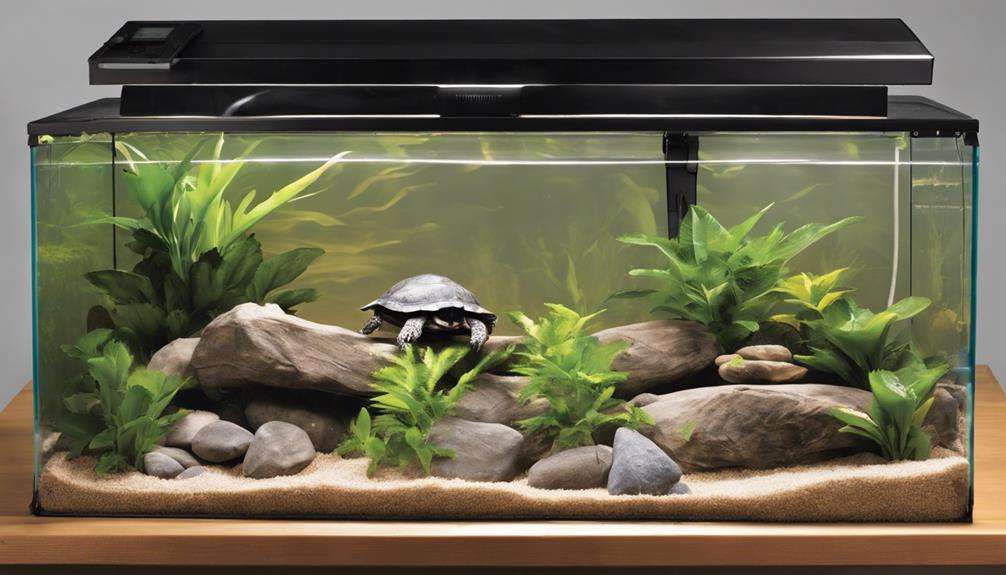
When setting up a habitat for your exotic turtle, focus on providing the right tank size. Ensure appropriate temperature and humidity levels. Incorporate enriching features like hiding spots.
Proper Tank Size
For the best well-being and safety of your exotic turtle pet, selecting the suitable tank size is an important aspect of their habitat setup. Aquatic turtles' tank size should be based on factors like the turtle's age, size, and sex. Hatchlings require 20-30 gallon tanks, while mature turtles need larger tanks ranging from 60-120 gallons. Tall enclosures with a secure screen top are recommended to prevent escapes.
It's important to have at least 2/3 of the enclosure filled with water and the remaining 1/3 for dry land to provide a balanced habitat. Make sure the water depth is twice the length of the turtle's shell to allow for comfortable swimming. Proper tank size and setup are crucial for the overall well-being and health of your exotic pet turtle.
Temperature and Humidity
Ensuring the best temperature and humidity levels in your exotic turtle's habitat is important for their health and well-being. Pet turtles thrive with a basking area temperature ranging from 89-95°F, aiding in ideal UV exposure and digestion.
Keep the water temperature in the tank between 75-86°F to support natural behavior and metabolic functions. Monitor humidity levels between 60-80% to prevent dehydration and shell issues in exotic turtle pets.
Utilize a reliable thermometer and hygrometer to accurately measure the temperature and humidity levels in the enclosure. Maintaining proper temperature and humidity regulation is essential for the overall health, digestion, and activity of your exotic turtle pets.
Enrichment and Hiding Spots
To create a stimulating and secure environment for your exotic turtle, incorporate a variety of enrichment items and hiding spots in their habitat. Provide tunnels, logs, and safe aquatic plants for mental and physical stimulation. Guarantee all items are safe and can't harm your turtle.
Concealing spots are essential for reducing stress and promoting well-being. Make sure all items are safe and can't harm your turtle. Concealing boxes in the basking area offer security and privacy.
A diverse environment with ample concealing spots and enrichment opportunities encourages natural behaviors. This setup fosters a sense of security for your pet, enhancing their overall well-being.
Temperature and Lighting Recommendations
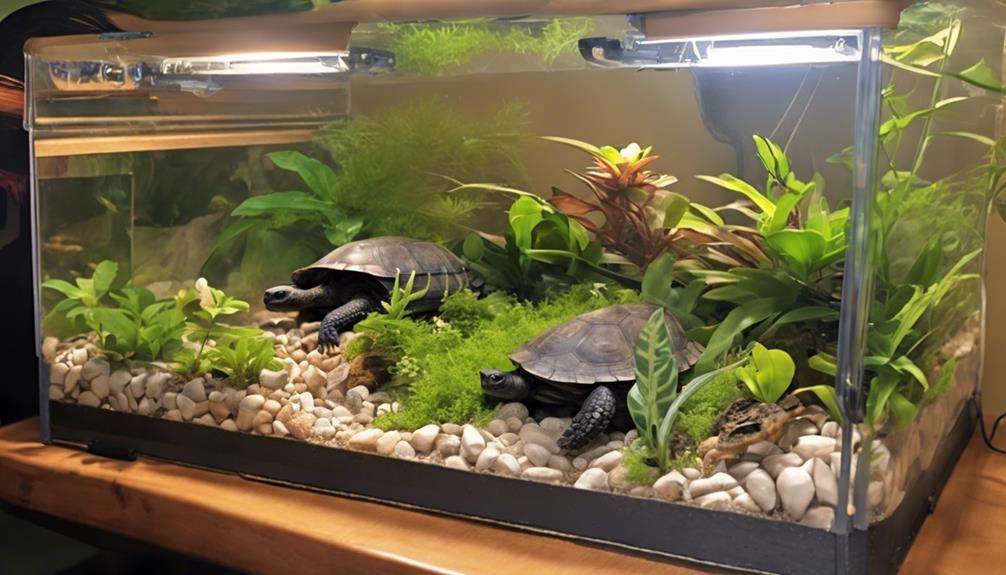
Maintain a basking area with temperatures ranging from 89-95°F to replicate natural sun exposure for your exotic turtle pet, ensuring their well-being and overall health. Adequate temperature regulation is essential for your pet's health.
Use UVA and UVB basking lights positioned about 12 inches away to provide essential UV exposure, aiding in the absorption of important vitamins necessary for their well-being. For aquatic turtles, maintain water temperatures between 75-86°F to support their metabolic functions. Utilizing a submersible heater in the tank can help regulate the water temperature effectively.
Ensure the UV lamps aren't too close to prevent overheating while still offering important UV exposure. By mimicking natural conditions with the right temperatures and lighting, you can create a healthy environment for your exotic turtle pet, promoting their overall wellness and happiness.
Common Health Issues in Exotic Turtles
As a responsible exotic turtle owner, it's essential to be aware of common health issues that can affect your pet.
Respiratory infections, shell rot, and vitamin deficiencies are among the typical concerns you may encounter.
Regular vet check-ups, a balanced diet, and a suitable habitat are key in preventing these health issues and ensuring your exotic turtle's well-being.
Health Issues Overview
Exotic turtles commonly encounter various health issues, including respiratory infections, shell rot, and metabolic bone disease. These issues can often stem from poor water quality, incorrect temperatures, inadequate nutrition, or lack of proper shell care. Parasites like worms and mites can also pose significant health risks to your pet turtle. Vitamin deficiencies, especially in vitamins A and calcium, are common concerns that can impact your turtle's overall health.
Additionally, shell fractures, abscesses, and injuries are potential problems that may require immediate veterinary attention. Regular health check-ups and close monitoring of your turtle's behavior are important for early detection and effective management of these health issues.
Preventative Care Measures
Regular veterinary check-ups play an important role in preventing common health issues like respiratory infections and shell rot in exotic turtles. Maintaining proper water quality and temperature is vital to reduce the risk of skin infections and parasites.
Providing a balanced diet with essential nutrients and supplements can help prevent vitamin deficiencies and metabolic bone disease. Habitat maintenance, including keeping the environment clean and well-maintained, lowers the chances of abscesses and shell fractures.
Early detection of health issues through close monitoring of behavior and physical appearance allows for timely intervention. By staying proactive with preventative care measures, you can guarantee the overall well-being and longevity of your exotic turtle pet.
Handling and Behavior Tips
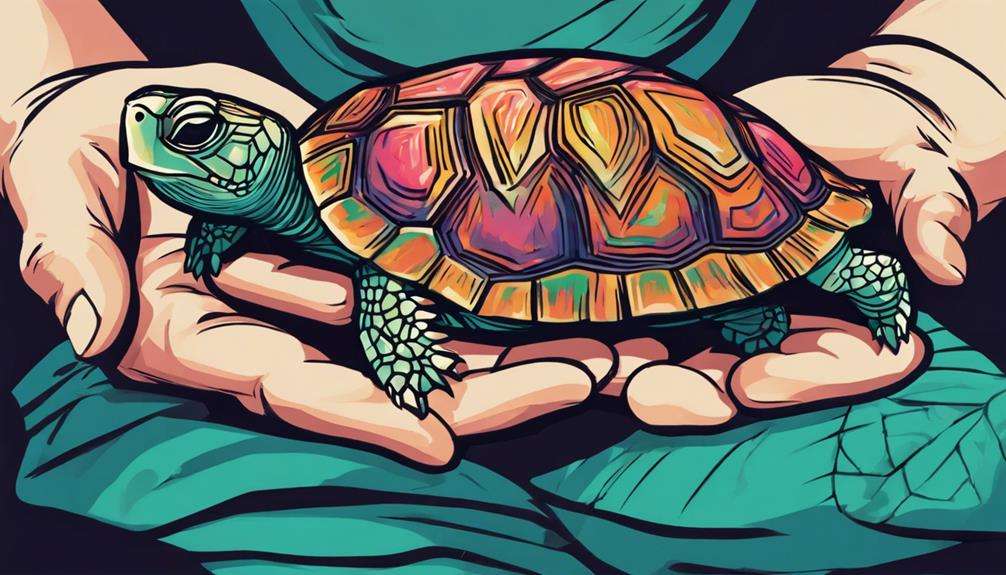
Supporting your exotic turtle's body properly during handling is crucial to prevent stress and injuries. When interacting with your aquatic pet, avoid picking them up by their legs, as it can distress and harm them.
Monitor your pet turtle's behavior closely for any signs of distress, such as hiding or a lack of appetite, which could indicate underlying health issues that need attention.
Creating a safe and enriching environment for your turtle to explore and interact in can help stimulate their natural behaviors and promote mental well-being. Remember to be patient and gentle when introducing new experiences to your pet turtle to build trust and reduce anxiety.
Understanding your turtle's body language, such as their shell position and eye movements, can provide valuable insights into their mood and needs, enhancing your bond with your exotic pet.
Selecting a Reputable Exotic Turtle Vet
When considering the well-being of your exotic turtle companion, one essential aspect to prioritize is selecting a reputable vet specializing in exotic pets. Your pet turtles need specialized care, and a vet experienced with aquatic turtles can provide the necessary attention. Look for a vet with certifications or affiliations with reptile organizations to make sure they've the expertise required.
Recommendations from other exotic turtle owners or local reptile clubs can also lead you to a trustworthy vet in your area. Make sure to visit the vet's facility beforehand to assess cleanliness, specialized equipment, and an environment that welcomes exotic turtles.
Regular check-ups and consultations are important for maintaining your pet's health and well-being. By choosing a vet who understands the specific needs of exotic turtles, you're taking a proactive step in providing the best possible care for your beloved pet.
Preventative Care Measures for Exotic Turtles
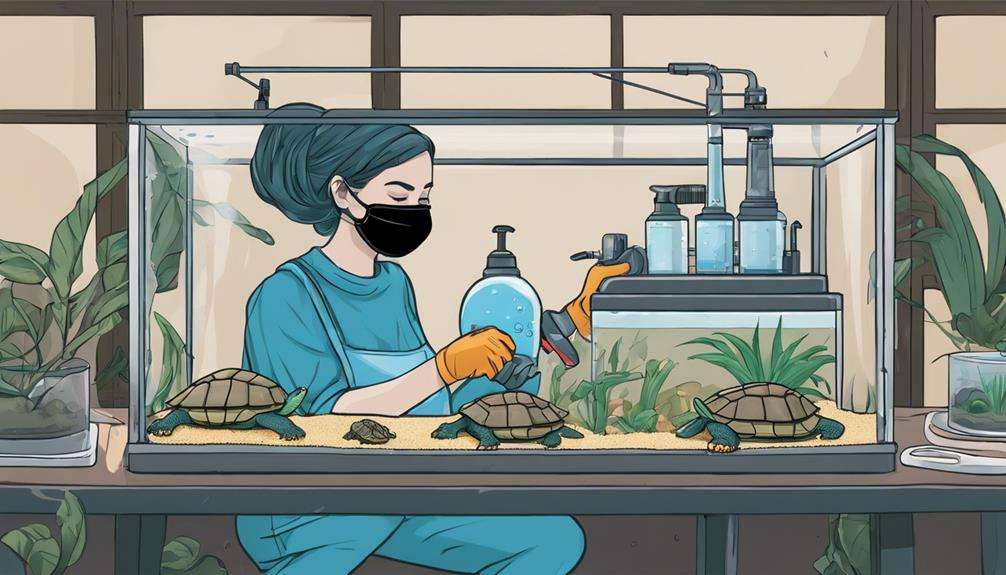
For the best health and well-being of your exotic turtle, implementing preventive care measures is essential. Aquatic turtles need a clean and spacious tank with a good filtration system to prevent water contamination. Regular water changes are vital to maintain water quality and keep your turtle healthy. Turtles require a balanced diet that includes protein, plant matter, and supplements. Offer chopped leafy greens like kale or collard greens along with commercial turtle pellets to make sure they receive proper nutrition.
Provide a basking area with a heat lamp to help your turtle regulate its body temperature and absorb essential vitamin D. Make certain the shell of your turtle is smooth and intact, as any cracks or abnormalities could indicate health issues. Be mindful of salmonella, a common bacteria in turtle feces that can be harmful to humans. Regularly clean and disinfect your turtle's enclosure to prevent the spread of this bacteria. By following these preventive care measures, you can help your exotic turtle live a long and healthy life.
Frequently Asked Questions
How Do I Take Care of My Pet Turtle?
To take care of your pet turtle, guarantee a balanced diet, a habitat with basking and water areas, and monitor behavior for signs of illness. Keep the tank clean, consult a vet, and maintain proper water depth.
What Not to Do With a Pet Turtle?
When caring for a pet turtle, avoid improper handling, overfeeding risks, rough play, ignoring tank size, exposing to chemicals, skipping vet visits, harsh cleaning methods, using wrong substrate, neglecting UV lighting, and not providing a proper diet.
How Hard Are Pet Turtles to Take Care Of?
Taking care of pet turtles can be challenging due to their long lifespan, specialized diet, habitat needs, and health concerns like salmonella. You must provide proper lighting, heating, and space, along with regular vet check-ups, to guarantee their well-being.
What Do I Need to Know Before Getting a Pet Turtle?
Before getting a pet turtle, research its needs thoroughly. Make sure a suitable habitat, proper heating, lighting, and diet are in place. Regular health checks are crucial. Over time, enjoy their long lifespan and consider enrichment activities for socialization.
Conclusion
As you navigate the intricate waters of exotic turtle care, remember that you're the guardian of a precious gem; a gem that requires delicate attention, steadfast dedication, and unwavering love.
By embracing the role of caretaker with grace and wisdom, you can guarantee that your exotic turtle thrives in a world crafted with care and compassion.
Keep shining brightly, dear steward of the shell-clad jewel.


